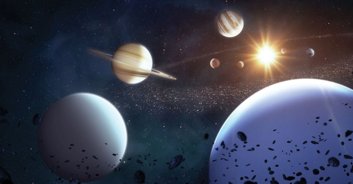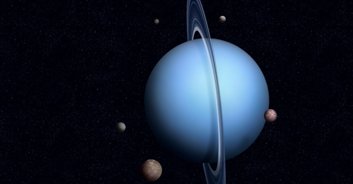Our great-great-grandchildren might be able to call a Space Uber and go to Mars, but most of us will never get the chance to journey into the cosmos. However, every so often, the splendors of space become visible to the naked eye. From the shimmering ethereal curtains of the Northern Lights to the occasional super blood moon, there's a lot to see in the sky, given the right circumstances.
If you live in the United Kingdom, tonight there is an excellent opportunity to see Uranus, the planet with the most hilarious name. If you look to the left of the moon, it should be visible as a small turquoise dot. If you own binoculars or a telescope, you can get an even better view. Although the moon is beginning to wane, it will still shine brightly enough to expose the seventh planet from the sun.
Uranus is visible this week because it is currently in opposition to the sun, rising while the sun sets. As long as those pesky clouds stay away, it should be visible all night, Mother Nature's perfect decoration for Halloween weekend. So, when you stumble home from the pub in your Sexy Handmaid's Tale costume, remember to look up from your phone and admire the beauty of this distant planet. Also, feel free to point at the sky and shout to strangers, "I can see Uranus!" They will appreciate the subtle humor.
There are some interesting facts about Uranus. It rotates on its side, instead of on an axis, like Earth and most other planets. It takes 84 years to take one trip around the sun (and you think your day was long). It has rings, and an atmosphere comprised of water, ammonia and methane ice crystals, which give the planet its distinctive blue color. It has 27 moons, with three named after characters created by William Shakespeare - Oberon, Titania and Miranda. And only one spacecraft has flown by the planet, the Voyager 2, in 1986.
Uranus was first spotted by in 1690 by John Flamsteed, who mistook the tiny glowing dot for a star, not a planet. Nearly a century later, in 1781, Sir William Herschel observed Uranus, and believed it was a comet. After determining that it orbited around the sun, astronomers gave it primary planet status.
The name 'Uranus' references a Greek god, Father Sky, the personification of the heavens. He was conceived by Gaea, Mother Earth, and went on to father eighteen children with her. (Hey, it's just how those Greek gods rolled, man.) However, he wasn't a good father, hiding each child back in Gaea's womb. Unable to stand the pain any longer, Gaea gave her son, Cronus, an adamantine sickle. The next time Uranus tried to sleep with Gaea, Cronus castrated him. Yay! I love a happy ending!
So, have a great night, and remember to check out Uranus!


